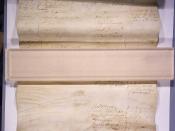There is no doubt that the success of the American Revolution was accomplished through the contributions of many great men all of which had inside them the "Spirit of '76." With the vacuum of power created once the British relinquished control of America a new system had to emerge that established law and order and had the support of the citizens of the young nation. The precedents established in the 1770's and the two decades thereafter were enormous in the shaping of the nation throughout its growth and remain to do so to this day. The vision of one man to have the states united under a common government and the ability to make compromises ranging from slavery to the residency of the national capital brought the differences of the leaders in the states to common ground. There is no founding brother that was more instrumental in creating the new United States and making it the great nation that it is today than James Madison.
James Madison's contribution to the framing of the United States government structure and the impact of his arguments on social issues were of paramount importance to broker the deal between the diametrical views of social opposites on such topics.
James Madison's vision for a centrally controlled government led him to become the "father' of arguably the most critical document in United States history, the United States Constitution. Madison recognized the fact that the current document binding the states in a loose manner, the Articles of Confederation, was too weak and needed to be altered or replaced. The Articles of Confederation lacked the power to wage taxes, enter agreements with foreign nations, or create an army on a national scale. These problems were realized in the wake of Shay's Rebellion and the Jay-Gardoqui Treaty. Madison then set out on a determined campaign to organize a meeting of the states to discuss amending the Articles. He met with some success in regional meetings: the Mount Vernon Conference of 1785 and the Annapolis Convention of 1786. But Madison continued to press for a general meeting of all the states. Madison was pleased when a meeting of all the states, except Rhode Island, was set for the summer of 1787 at Philadelphia. Many of Madison's ideas were embodied in the Virginia Plan, which was proposed by the Virginia delegation early in the convention.
His plan calling for a checks-and-balances system between three branches of government alleviated the fears that many of his contemporaries had of a power central government.
Similarly, the proper division of power between the national and state governments, a novel concept called "federalism," would preclude the dangerous concentration of power in any one place. Madison thought that the Articles had not given the central government enough power to check the states, and therefore he supported a stronger central government. James Madison led the fight for a vastly expanded national government with sovereign power over the states. His plan for such a revolutionary system of government faced adversity between the many delegates in order for it to be ratified. Without the great oratory skills Madison possessed and his ability to compromise the U.S. Constitution would not have become to be the founding document which our society still refers to so passionately today.
One of the great compromises that came about at the Constitutional Convention started as a sectional difference between the north and south involving the institution of slavery. Madison, when drafting the Constitution, understandably did not include the aforementioned issue for fear that the republican experiment would die in its early years of existence. Madison was aware that slavery was the cause of the main division in the Constitutional Convention: "the States were divided into two different interests not by their difference of size," Madison observed, "but principally from their having or not having slaves...It did not lie between the large and small states: it lay between the Northern and Southern." It was obvious that a compromise needed to be made to resolve the sectional conflict, or at least delay to the inevitable war that would ensue, in order to keep alive his national vision. A deal was made regarding the evil institution of slavery, a "sacred compact" between the north and the south, where the states admitted in the Northwest Territory would not permit slavery and that the slave trade would be prolonged for 20 more years. This also opened the door to increase the sectional tensions due to America's continuous expansion and the admittance of northern states as free and south states as slave states. This appeasement on both sides allowed the country to become mature enough to deal with the "necessary evil" when it was to arise some seventy years later instead of having slavery issue halt the experiment in its nascent stage of development.
His greatest accomplishment, I believe, was his recognition that the Constitution could open the way to tyranny by the central government and the need for an individual bill of rights. Granted, he was opposed to such amendments to the Constitution at the onset of the debates with Antifederalist leaders like Patrick Henry, but once again his ability to foresee the future allowed him to make a compromise between his views and that of his political opponents. In the first Congress after the new government was implemented, Madison pushed forth for his original twelve amendments of the Constitution of which the last ten were approved guaranteeing liberties to the individual citizens. There is no other political document referred to more than the Constitutional Bill of Rights due to its enormous significance from the time it was indoctrinated to this very day. Fresh in the minds of the revolutionary generation was the memory of the British violation of civil rights before and during the war for independence.
After the passing of the Revolutionary War, there were several divisions between the states that precluded them from standing under the umbrella of a common national government. Two issues that divided the states into regional opinions on the matter was the financial status of the states of the union and the location of where the national capital was to reside. Without an agreement over the chasm the national government would "burst and vanish, and the states separate to take care of everyone of itself." A plan brought forward by Alexander Hamilton, the Secretary of Treasury, called for the federal government to incur the debts created by the states. There were vicious arguments regarding the assumption of state debts with some stating that some states had made good on their promise to pay off war debts, but others had not. If the debts of states that had failed to pay were shifted to the federal government, citizens in states that had paid their debts would end up paying twice. More dangerously, some had visions of the past with the National Bank back in England and the fear of the corrupt institution encroaching on American soil. Among the states opposed to assumption of state debts was Virginia and coincidentally she was also unsettled about the planned location of the federal capital in New York. This leads to the second half of the agreement, that being the relocation of the United States capital from New York to the Potomac. Prominent Virginians always envisioned the capital to reside along the Potomac due to its demographically central location in the nation, its thought to be a direct link to the Mississippi River, and the feeling that such profitable commerce would pass through state. A major deal was brokered whereby Madison would sway the needed votes to approve of the assumption of debts and Hamilton would prevent his northern constituents from blocking the relocation of the nation's capital to the Potomac. With the crippling crisis averted the infant government had passed the first test of political controversy without dissolving.
Another monumental decision marked by sage judgment by James Madison was in the summer of 1798. On the fourth of July of that year Congress passed the Sedition Act which established heavy fines and possible imprisonment for writing, speaking, or publishing damaging remarks against the U.S. government or government official. This "confirmed that the Federalist agenda violated the central tenets of the American Revolution, conjuring up memories of Parliament's restrictions on the colonial press..." Madison's masterful handling of the situation was characterized by his everlasting goal for a tightly knit union of the states which manifested itself in his creation of the Virginia Resolution. Unlike his companion Thomas Jefferson who responded to the Sedition Ace by stating "we should sever ourselves from that union we so much value, rather than give up the rights of self government which we have reserved," if it was not repealed. Madison was much more cautious in his arguments and appealed to document which he founded himself, the Constitution, and called for the protections provided by the very government which he was so much a part of developing. He was suggesting that the federal courts and not the individual states that had the final decision on Constitutional arguments. This argument by Madison led toward the modern doctrine of judicial review and constitutional guarantees for free speech and freedom of the press. I can not think of any other civil liberty that America enjoys today more than freedom of speech and of the press which are outlined so beautifully in the First Amendment in the Bill of Rights.
During the Mount Vernon Conference here was there, he was there at the Annapolis Convention and he was in Philadelphia when the Constitution was being debated and approved. His many essays to allay the fears of Anti-Federalists, known as the Federalist Papers, pointed out the brilliance of the Constitutions and the safety nets that prevented one government branch from gaining too much power. It is no coincidence that "little Jimmy Madison" was in attendance at all the stages of the development of the federal government; it was his superior ability to influence his constituents to follow his path into his nationalistic dream that made our country what it is today. One observer said of the five feet six inch man, "Never have I seen so much mind in so little matter." He embodied the very essence upon which the country was found, compromise. With such strong opposition against the ideas in the Constitution that he proposed in 1787 only a man with Madison's vision, oratorical ability, and brilliant mind could have pulled it off, and he did. If it were not for Madison and his influential presence in the most critical moments of the national movement, the United States in which we live would not be the glorious country that we celebrate on a daily basis.


